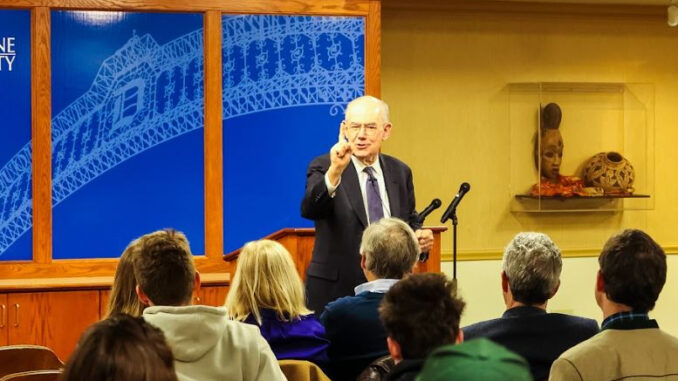
Benjamin Karazsia | Staff Writer
The future looks grim. Prominent political scientist John Mearsheimer visited Duquesne on Monday, to talk about the grim state of United States foreign policy in Ukraine, Israel and China.
John Mearsheimer is the R. Wendell Distinguished Service Professor at the University of Chicago, and much of his research focuses on the behavior of great powers in the international system. His discussion at Duquesne marked the inaugural speech for the political science department’s New Perspectives on Public and Foreign Policy speaker series.
Mearsheimer has authored several books, including the New York Times best seller “The Israel Lobby and U.S. Foreign Policy.” He is credited with putting forward the theory offensive realism. This means states are constantly power seeking, with the goal of reaching hegemony to ensure security.
Clifford Bob, the chair of Duquesne’s political science department, praised Mearsheimer for his contributions to the field and said he is a leading political scientists
“He’s one of the most distinguished political scientists and especially international relations specialists in the world,” Bob said, “someone who can be depended upon to give, I think, a very reasoned, well-argued perspective.”
Mearsheimer’s talk covered three current issues affecting the future of American foreign policy: the war in Ukraine, conflict in the Middle East and the potential threat of Chinese dominance in East Asia.
“We’re pinned down in Europe, we’re pinned down in the Middle East, and we’ve driven the Russians right into the arms of the Chinese,” Mearsheimer said.
For Mearsheimer, the prospect for a victorious Ukraine is low.
“The Russians are going to win an ugly victory,” Mearsheimer said.
He also discussed the war in the Middle East, and the rising potential for America to be bogged down in a large conflict involving Israel, Palestine, Hezbollah and other actors, as well as necessitating the possibility of Chinese power rivaling the United States.
“The United States does not tolerate other regional hegemons,” Mearsheimer said.
Mearsheimer also commented on the willingness of former president Donald Trump to abandon NATO allies, if elected, for supposedly refusing to pay their fair share of defense spending targets.
“I don’t think he’ll be able to cut and run like he says he will, but who knows for sure,” Mearsheimer said.
Mearsheimer said to The Duke that his viewpoints are not usually accepted by the mainstream media, or by academia.
“There’s no question in my mind that my views on the causes of the Ukraine war, the conduct of the Ukrainian war and the question of where the Ukraine war is headed have been largely iced out of the mainstream media,” Mearsheimer said. “I think that my argument that the Ukraine war is largely a result of NATO expansion is an argument that people in the foreign policy elite do not want to hear and is an argument that most academics don’t want to hear, as well.”
Duquesne’s New Perspectives on Public and Foreign Policy speaker series will continue to invite speakers with a wide variety of perspectives on important issues in the future, Bob said.
“All the political science faculty members want to expose students and, frankly, the Pittsburgh community, more broadly, to a very wide variety of perspectives on these kinds of critical issues,” Bob said.
Sophomore student Nicholas Petrilli remarked positively about the prospect of new perspectives and ideas coming to campus.
“I’m all for hearing different perspectives on my own or from stuff that I’ve learned. So I think it’s just a cool opportunity to have different people, and especially highly educated people, come and talk to us,” Petrilli said.
Junior Student Lance Catlos explained that he gained insight during Mearsheimer’s speech, and that the talk changed his outlook on some issues.
“I actually got new perspectives. So actually, I kind of now agree with some of the stuff he’s saying,” Catlos said.
Toward the end of his speech, Mearsheimer left the audience with a chilling prediction for the future of American foreign policy.
“Five or 10 years from now, if someone like me comes to talk to you about the state of American foreign policy, it will be as bleak, or bleaker,” Mearsheimer said.

